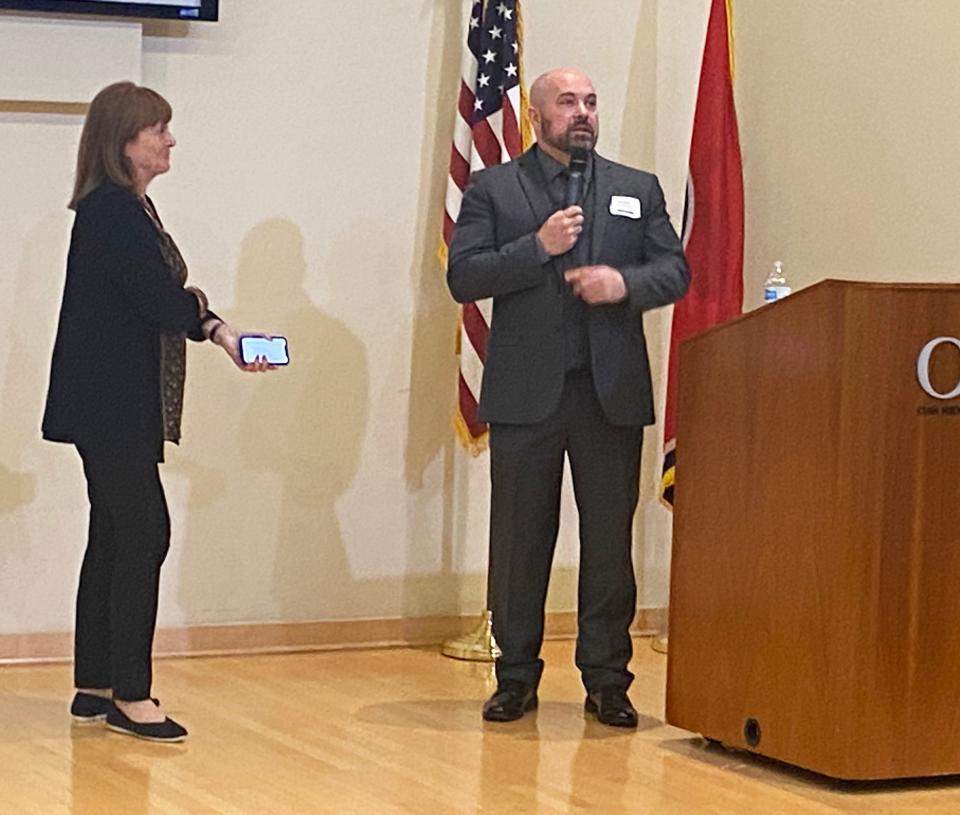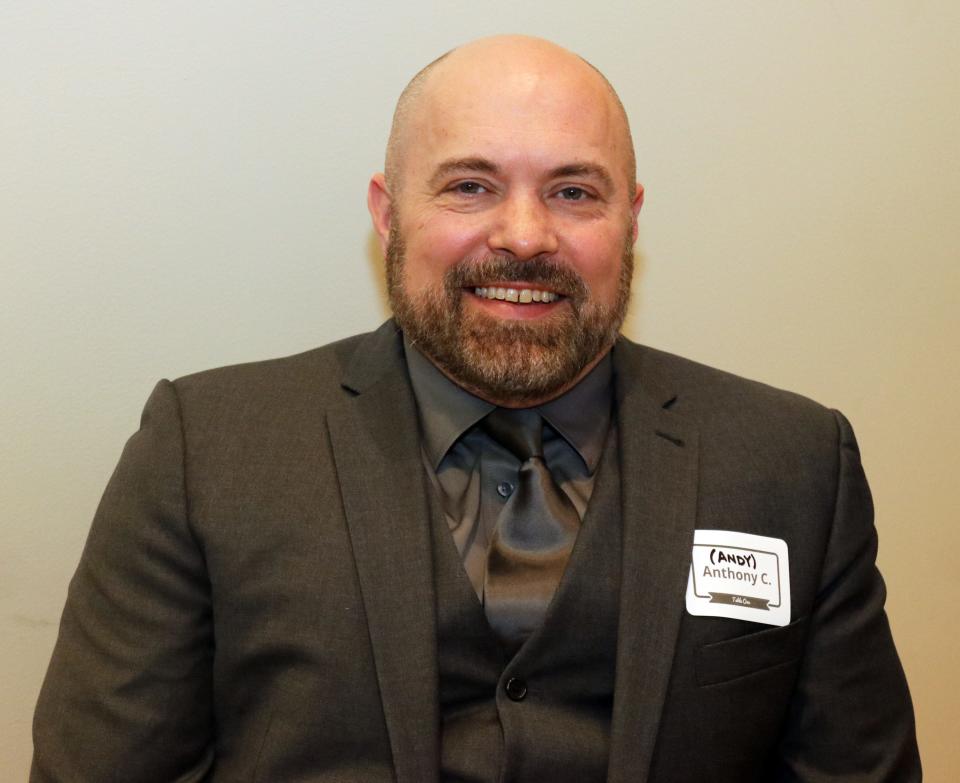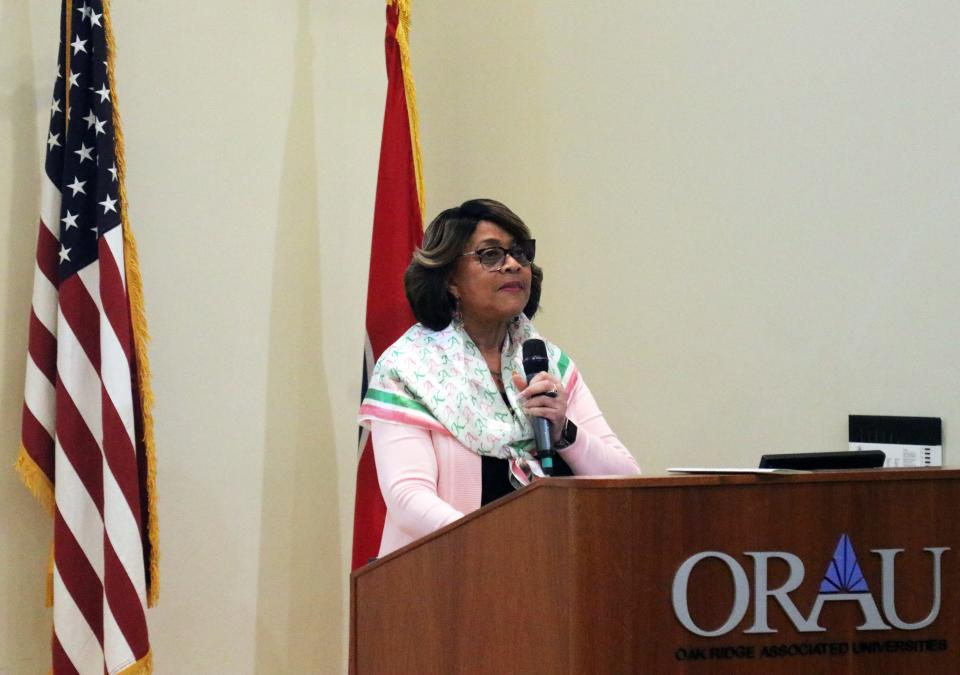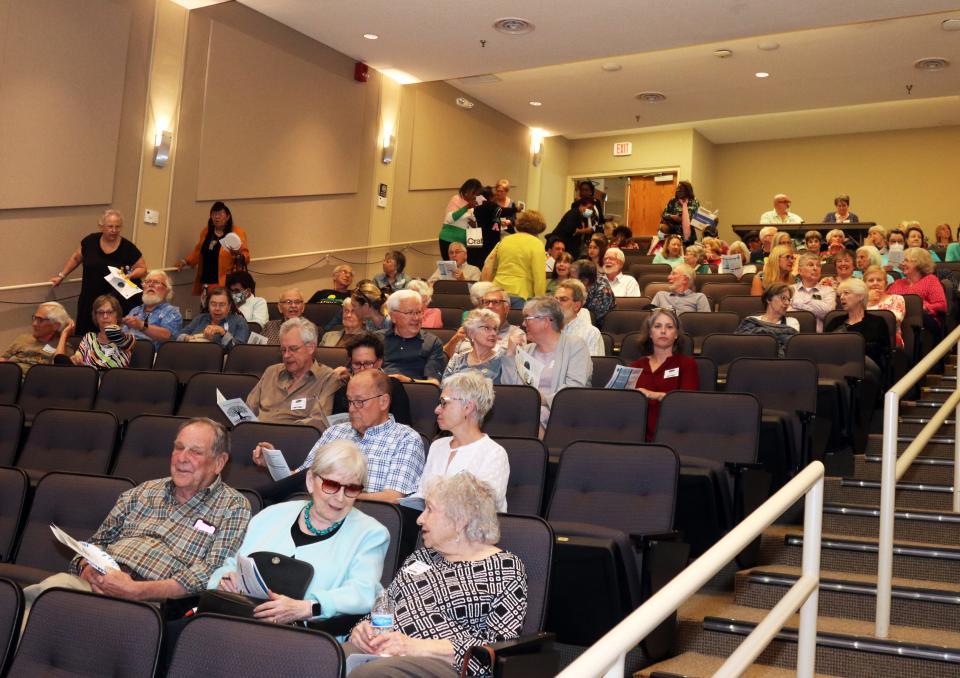Why hate speech can't always be prosecuted as a hate crime
Hate speech seems so prevalent these days, partly because creating and spreading it is so easy using social media. But few Americans are convicted of hate crimes. That’s largely because of the U.S. Constitution and the provisions in four federal hate crime laws, according to Anthony "Andy" Crabtree, a special agent with the Federal Bureau of Investigation for 20 years.

He was speaking on the “Roots of Hate Crimes in America,” the third lecture in the "Roots of America" exploration of cultures series co-sponsored by the Oak Ridge Breakfast Rotary Club and the Oak Ridge Institute for Continued Learning. During his FBI career, Crabtree has worked on catching spies and disarming weapons of mass destruction, as well as investigating civil rights violations - including crimes against children - and white-collar crimes such as public corruption, complex financial crimes and health care fraud.
Over the past five years, he said, only 18 people were investigated for possible hate crime violations in Tennessee by FBI’s two divisions in Knoxville and Memphis. Only 10 of them were prosecuted, Crabtree added, noting that in 2022 the FBI’s Knoxville division investigated only three possible hate crimes – one religious case and two sexual orientation cases. He was a supervisory special agent in the Knoxville Division for six years.

Nationwide, he added, in 2022, FBI agents made 61 arrests, and 47 people were convicted of hate crimes. In 2023 so far, 17 people received hate crime convictions. Of the possible hate crimes reported in 2023 nationwide, he said that 48% involved race; 22%, religion; 28%, gender, orientation, national origin and disability, and 2%, housing. The FBI is currently investigating more than 225 cases of possible hate crimes nationwide.
Crabtree said most hate speech in public, such as “Kill Jews” or “Kill gays,” is protected by the right to freedom of speech guaranteed by the First Amendment of the Constitution.

"That’s why it’s so hard for the FBI to prosecute cases involving the expression of hatred because of the confusion over what is free speech and what is a true threat, which can lead to physical harm,” he asserted. “Organizing and gathering to promote hate is considered free speech as is circulating offensive material and posting bigoted views online.”
The FBI has identified many people who make or post hate statements like “all gays should die,” but cannot arrest them because their assertions are legal free speech, Crabtree said. “Then when one of them commits a shooting at a gay bar, everybody blames the FBI” when the public learns the federal agency knew about the shooter’s bias against gays.
FBI agents often “feel the same way you do,” he added. “We want to get to the bottom of hate incidents and do what’s right and make people whole.” But that’s not easy to do because the FBI’s job is to follow federal laws in its investigations of potential crimes.
Does it affect interstate commerce?
Crabtree interacted with the audience in Pollard Auditorium as he described four federal hate crime laws, presented various scenarios and asked the attendees whether a scenario is or is not a hate crime. One surprise for many in the audience was that a violent action by a bigoted person who injures a targeted individual might not be prosecuted as a hate crime if the action has no impact on “interstate commerce.”
He gave an example from his own experience after speaking about the Hate Crimes Prevention Act of 2009, which “prohibits causing bodily injury (or attempting to do so) because of actual or perceived race, color, religion, or national origin. This statute also prohibits causing bodily injury, or attempting to do so, using fire, a firearm, or a dangerous weapon because of a person’s actual or perceived religion, sexual orientation, gender identity, gender, national origin or disability. The crime must affect interstate commerce.”

“A year ago, at East Tennessee State University, I had a victim come to me who claimed he was assaulted by two football players,” Crabtree said. “So, I began an investigation and found that the three men got into an altercation at a gas station. Then as the victim started driving home, the football players followed him in their car. When they all got out of their cars, the football players walked toward the victim, yelled slurs at him regarding his sexual orientation, then struck him and knocked him out.”
Crabtree thought at first he had good reasons for charging the football players with a hate crime. Then he realized from reviewing the law that the assault involved the use of fists, not firearms, and that it had no impact on interstate commerce.
“If the victim had been working at an Amazon fulfillment center getting packages ready for delivery to another state and if injury to the victim delayed delivery of many packages, or if the attackers had a gun made in a different state, the charges would stick. The victim had no job that affected interstate commerce. That’s why I couldn’t charge his attackers.”
Because of the interstate commerce provision, he said, it’s rare that the FBI can charge people with a hate crime under the Church Arson Prevention Act after they burn and vandalize churches.
He gave an example of a violation of the Federally Protected Activities Act, which “prohibits willfully injuring, intimidating, or interfering with any person (or attempting to do so) by force or threat of force because of race, color, religion, or national origin” when they are participating in a federally protected activity.
A white man approached three Black women sitting under a tree on break from their jobs of helping the government clean up an area after a hurricane damaged New Orleans. “The man called them ‘lazy n###ers,” among other racial slurs,” Crabtree said. “He struck two women and pushed a third to the ground and spat in her face when she began recording the incident.” Most of the audience agreed correctly that this was a hate crime.
A famous hate crime that violated the Federally Protected Activities Act was the incident in which white students placed a noose and Confederate flag around the statue of James Meredith at the University of Mississippi, a public university supported partly by federal and state funds. Meredith was the first Black student to attend the university, where he endured constant verbal harassment from a minority of students.
Crabtree gave two examples of hate crimes that were violations of the Fair Housing Act, which “prohibits using force or threats of force to willfully injure, intimidate, or interfere with any person’s housing rights because of race, color, religion, national origin, gender, disability, or familial status.”
In one case, he said, “Three individuals hung a toy camel from a noose on their neighbor’s door. The neighbor was Jordanian, Arabic in ethnicity, and Muslim. The defendants watched a video on the Internet to learn how to make a proper noose.”
Crabtree said the FBI successfully charged them with a crime under the Fair Housing Act because of the residents’ national origin and the fact that the individuals who targeted them used the internet, which is considered interstate commerce, to find out how to make the noose.
Under this law, if someone spray paints the sign “Kill Jews” on a house in which a Jewish family lives, that person would be convicted of a hate crime because the residents are Jewish, Crabtree said. But he added, “If a Christian or other non-Jewish people lived there, the sign painter could be prosecuted for vandalism, not a hate crime.”
Only vandalism would likely be the charge for someone who spray paints the sign “Kill gays” on the garage of a house where the residents are LGBTQ people. It would not be a hate crime, Crabtree explained, because the housing law does not list “sexual orientation” and “gender identity” as groups that are protected.
This article originally appeared on Oakridger: Why hate speech can't always be prosecuted as a hate crime

